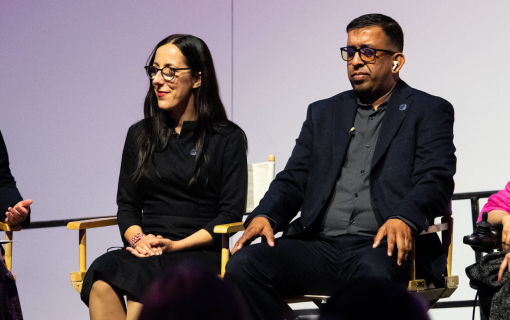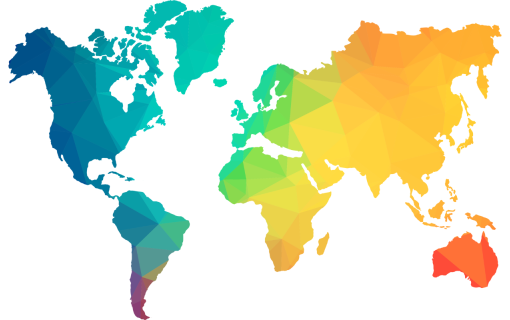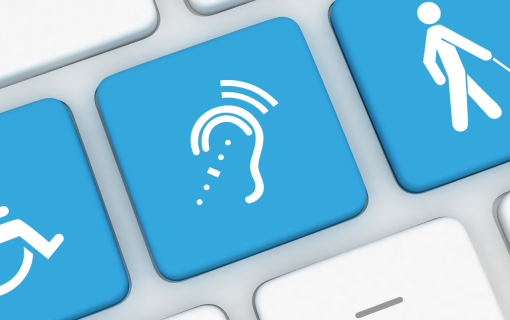Becoming an Inclusion Advocate: A Q&A with Anais Keenon
Anais Keenon, who is currently pursuing a master’s degree in international development from Gallaudet University, is on her way to becoming a leader in the international disability inclusion movement. A native of Wilsonville, Oregon, she spent the summer working with IFES’ Inclusion Officer Virginia Atkinson analyzing the legal frameworks of countries around the world to see how they perform in recognizing the rights of persons with disabilities.
She answers some questions on how laws help promote equal access, what it really means to be inclusive and what people can do to better foster awareness.
How did you come to the realization that you wanted to work on disability inclusion?
My interest was sparked about five years ago during my freshman year of college in southern California. I knew I wanted to pursue disability inclusion as a career around 2011. I interned at Mobility International USA, and then I had a summer internship in Ghana where I interviewed several Ghanaians with disabilities. After these two experiences, when I realized the depth of the challenges that people with disabilities face both within the United States and abroad, I knew that disability inclusion work was something I could – and should – take on full-time.
During your internship at IFES, you studied the constitutions of the U.S. and countries around the world. What did you learn?
Worldwide, every country (including the United States) has some legislative difficulty they need to tackle. The most glaringly oppressed or disenfranchised groups in terms of electoral access are people with psychosocial, intellectual or developmental disabilities. In some countries, this includes people with physical or sensory disabilities as well. For example, in many places you cannot run for office if you cannot read or write. This tends to exclude members of the Deaf community, as sign language is usually their first language and they rarely have an equal opportunity to learn how to read and write.
When we discuss the electoral process, it is not just about the right to vote, although that certainly is a high priority. It is also about the right to run for office and remain in office if a person acquires a disability during their service. Many countries do reasonably well with the right to vote, but fall short when it comes to allowing people to run for or remain in office.
At the state-level in the United States, there is still a struggle to ensure that terminology is updated (e.g., "insane" or "idiots" are still used in a few state constitutions, such as New Mexico and Kentucky) and there needs to be broader discussion of what "incompetence" or guardianship legally means in an electoral context. While there has been some discussion on the legal ramifications, there is still a long way to go to ensure that states are not unintentionally disenfranchising potential electors.
Having mentioned all of this, there were some pleasant surprises when I discovered constitutions and legal rights that were remarkably advanced in electoral access for their regions, such as Kenya and Ecuador. Additionally, many countries are actively working to update their constitutions or electoral laws, such as Japan and the Philippines, which have made legislative changes as recently as May 2013.
You say countries like Kenya and Ecuador are remarkably advanced as far as legal rights for persons with disabilities and electoral access. How does this translate to daily life? How does having strong laws benefit persons with disabilities on an individual level?
In the case of Kenya and Ecuador, the laws reflected the advocacy efforts of people with disabilities. Ecuador had a Vice President, Lenin Moreno, who served until May 2013. He used a wheelchair and became a staunch advocate for disability rights while in office, and Ecuador's laws reflect his work. Kenya's laws are the result of tireless lobbying by people with disabilities, especially Deaf communities. Consequently, Kenyan Sign Language is heavily protected by national law.
Once laws become accepted as the norm, they then have the long-term potential to produce a sea change. When the legal requirement of ramps for buildings was first introduced in the United States, it was a big change and there was a lot of resistance. After advocacy efforts raised the awareness level to a sustainable degree, we have seen payoff; decades later ramps have become so routine that we rarely think twice about it.
For countries like Kenya and Ecuador, these laws are still new enough that they will need continued support from citizens and government officials. I am optimistic that, as long as support for disability laws is maintained, we will see a normalization of access for citizens with disabilities in the coming decades.
Please tell us the difference between electoral accommodations and electoral inclusion.
Electoral accommodations are tangible changes to make the electoral process accessible to people with disabilities. In other words, it includes adding a ramp or handrails; allowing guide dogs to enter a public space; and providing sign language interpreters.
Electoral inclusion is about altering the public perception of people with disabilities, and is more difficult to measure. Providing accommodations is a tool to get people to think about and become used to seeing people with disabilities participate in the electoral process, but electoral inclusion is about taking it a step further by challenging the stigma and beliefs about disability.
How can people help promote the rights of persons with disabilities?
Exercise your electoral rights, look at the legislation you vote for and think about the impact it might have on the rights of people with disabilities. If you plan events of any kind, and it is possible that a person with a disability will attend, either privately ask them if there is anything you can do to improve the accessibility of your event, or make sure the venue is accessible from the get-go. For example, make sure a polling place has ramps and handrails, or that it is as close to public transportation as possible. Additionally, make it easy for people with disabilities to request accommodations.
Also, be curious. Educate yourself on the different types of disabilities. Knowing the right terminology or basic needs will put you ahead of the curve, no matter what country you are from. Discuss disabilities and really think about what a person with a disability can and cannot do. The fastest way to learn is to get to know people with disabilities.
These things will make it easier for them to advocate for their rights and to allow others to serve as strong allies and supporters.
How will your internship at IFES help in the pursuit of your future goals?
My time at IFES has helped to increase my legislative knowledge. Prior to this internship, I worked primarily from anecdotes and statistics. In the future, I can make even more powerful and persuasive arguments on why the rights of people with disabilities need to be promoted on a global scale.
This internship has also afforded me the surprisingly rare opportunity to exclusively work on disability inclusion (within an electoral context, of course). Most internships I have had were more general, and I had to incorporate disability-oriented work on my own.
While I do not yet have a job title in mind, I do know that my future work will combine communications, international development and cross-disability inclusion. IFES has been a great stepping stone toward that goal.









